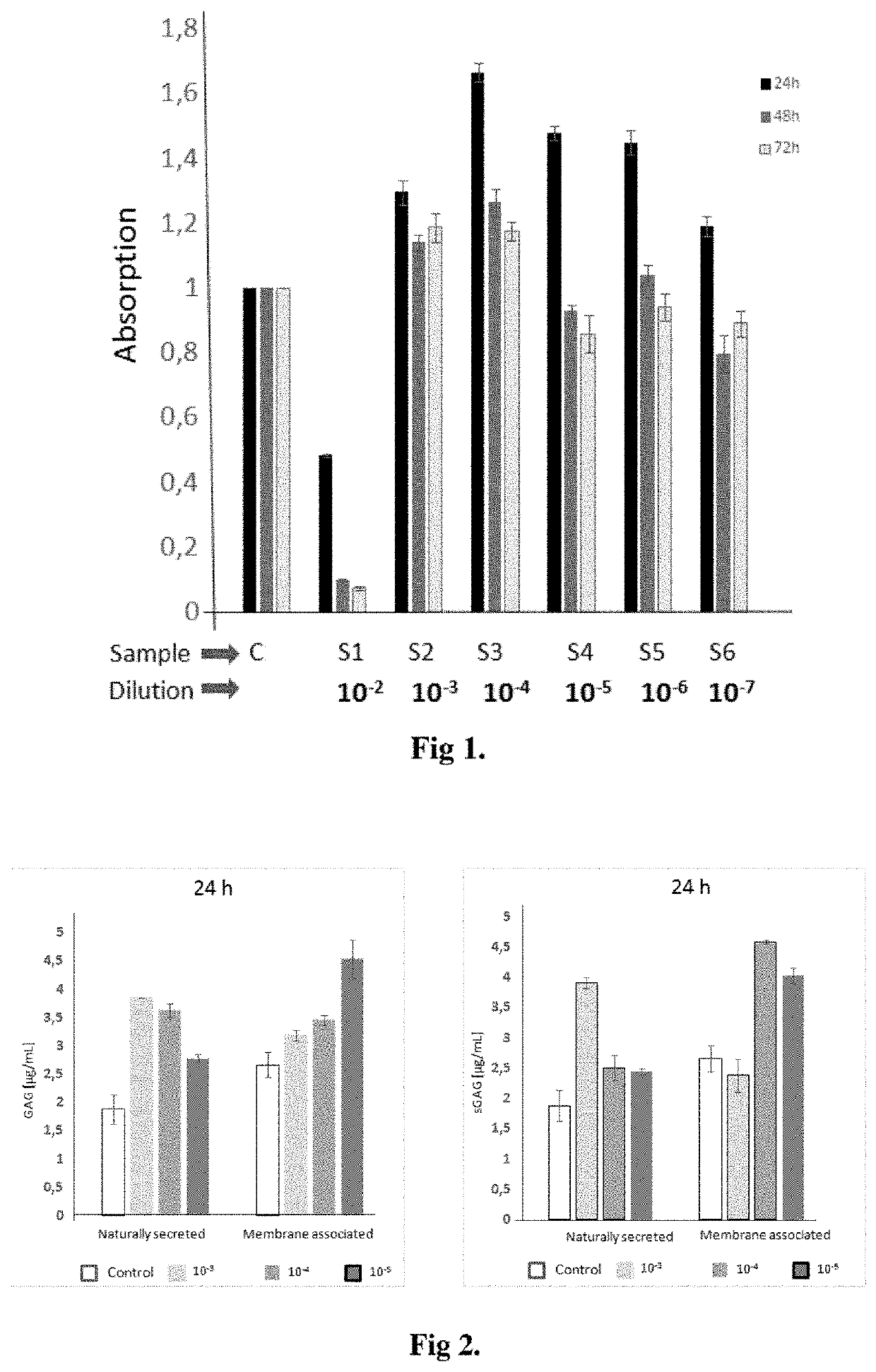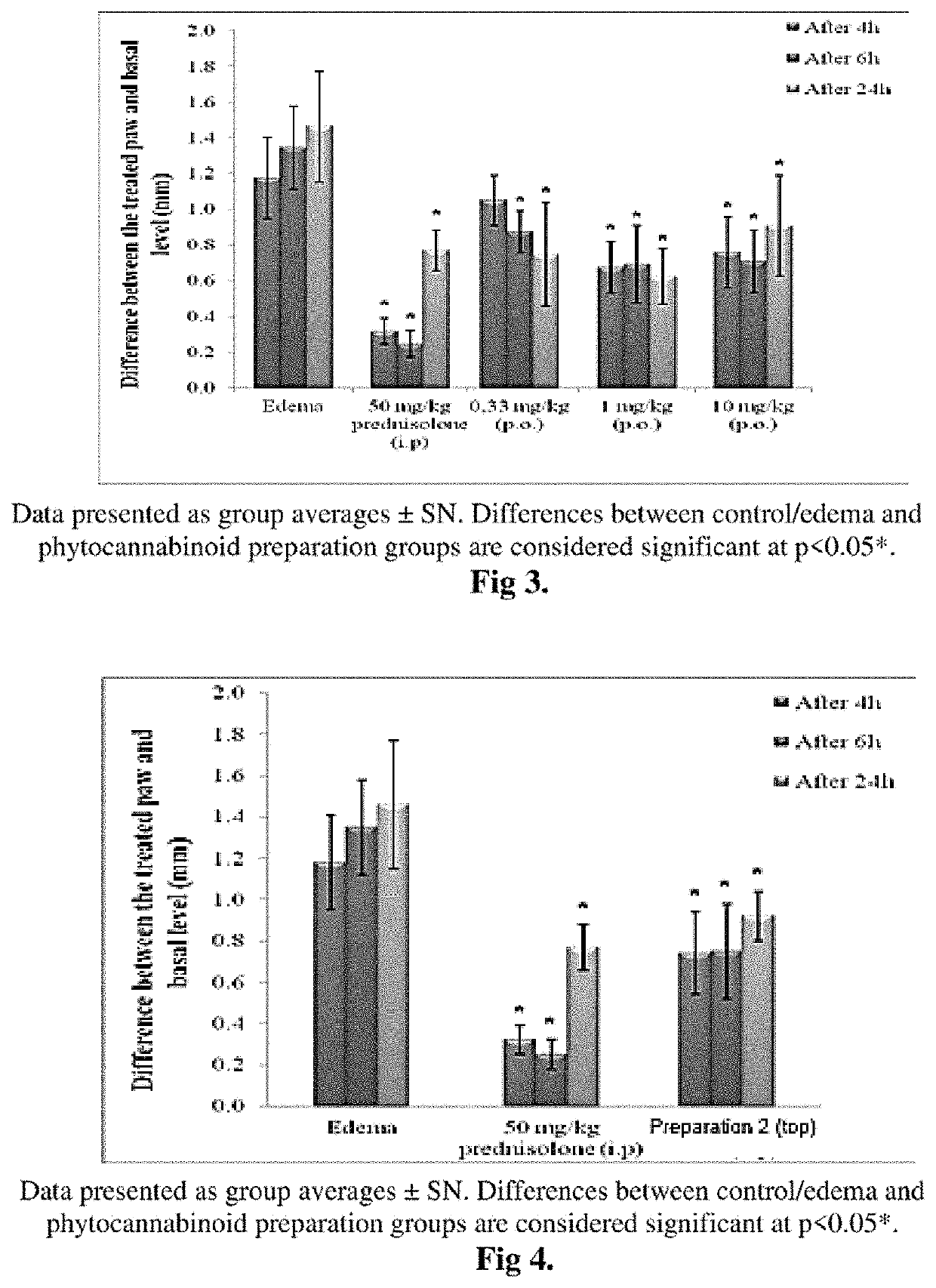Topical composition with active compounds from Cannabis sativa and Calendula officinalis for reduction of skin lesions
a technology of active compounds and topical compositions, which is applied in the direction of drug compositions, plant/algae/fungi/lichens ingredients, drug delivery, etc., can solve the problems of elevated oxidative stress level, trans-epidermal water loss and lower hydration of stratum corneum, and harmful generation of reactive oxygen species (ros) in the skin
- Summary
- Abstract
- Description
- Claims
- Application Information
AI Technical Summary
Benefits of technology
Problems solved by technology
Method used
Image
Examples
example 1
[0033]Experimental Procedures
[0034]Cell Culturing.
[0035]Primary cell line of Human keratinocytes Heka (Gibco, ThermofisherScientic) was cultivated in GIBCO EpiLife serum-free cell culture medium with S7 supplement (ThermofisherScientic) in a microwell plate of 24 vials, 20,000 cells / per well, at 37° C., 5% CO2. The viable cells after adhesion to the well surface were subjected to 2 μl of Cannabis sativa extract which is used in described topical composition. The extract was prepared after several dissolving steps in ethanol to reach dilution levels from 102 to 107. The blank control—raw Cannabis sativa seed oil was prepared analogically. The Cannabis sativa extract comprises 18% of cannabinoids CBD / CBDA / CBDV / CBG, and 80% of CBDA from the total cannabinoid level.
[0036]Cell Viability.
[0037]Living cells were determined using the CCK-8 kit (Cell Counting Kit, Dojingo) while following the manufacturer's instructions. The amount of formazan resulted by activity of dehydrogenases dye was m...
example 2
[0047]Experimental Procedures
[0048]The effects of two phytocannabinoid preparations (JSC SATIMED): “Preparation 1” (in which the concentration of phytocannabinoids is 40 mg / ml, extract diluted 4.5 fold with raw Cannabis sativa seed oil) and “Preparation 2” (10 mg / ml of phytocannabinoids, extract diluted 10 fold with raw Cannabis sativa seed oil), were analysed on the model of acute inflammation (paw edema) in mice. Three single doses of preparation “Preparation 1” (0.33 mg / kg, 1 mg / kg and 10 mg / kg phytocannabinoids) and one dose of “Preparation 2” (0.23 mg phytocannabinoids) were tested. The experiment was performed on 48 mice (BALB / c strain ♀, 6-7 weeks old, average weight 23 g), which were divided into 6 groups (6 mice per group), and in all of them paw edema was induced:
[0049]1 group. Edema / control—no treatment
[0050]2 group. 50 mg / kg prednisolone / control i.p.
[0051]3 group. 0.33 mg / kg phytocannabinoids “Preparation 1” p.o.
[0052]4 group. 1 mg / kg phytocannabinoids “Preparation 1” p....
PUM
| Property | Measurement | Unit |
|---|---|---|
| temperature | aaaaa | aaaaa |
| temperature | aaaaa | aaaaa |
| temperature | aaaaa | aaaaa |
Abstract
Description
Claims
Application Information
 Login to View More
Login to View More - R&D
- Intellectual Property
- Life Sciences
- Materials
- Tech Scout
- Unparalleled Data Quality
- Higher Quality Content
- 60% Fewer Hallucinations
Browse by: Latest US Patents, China's latest patents, Technical Efficacy Thesaurus, Application Domain, Technology Topic, Popular Technical Reports.
© 2025 PatSnap. All rights reserved.Legal|Privacy policy|Modern Slavery Act Transparency Statement|Sitemap|About US| Contact US: help@patsnap.com


